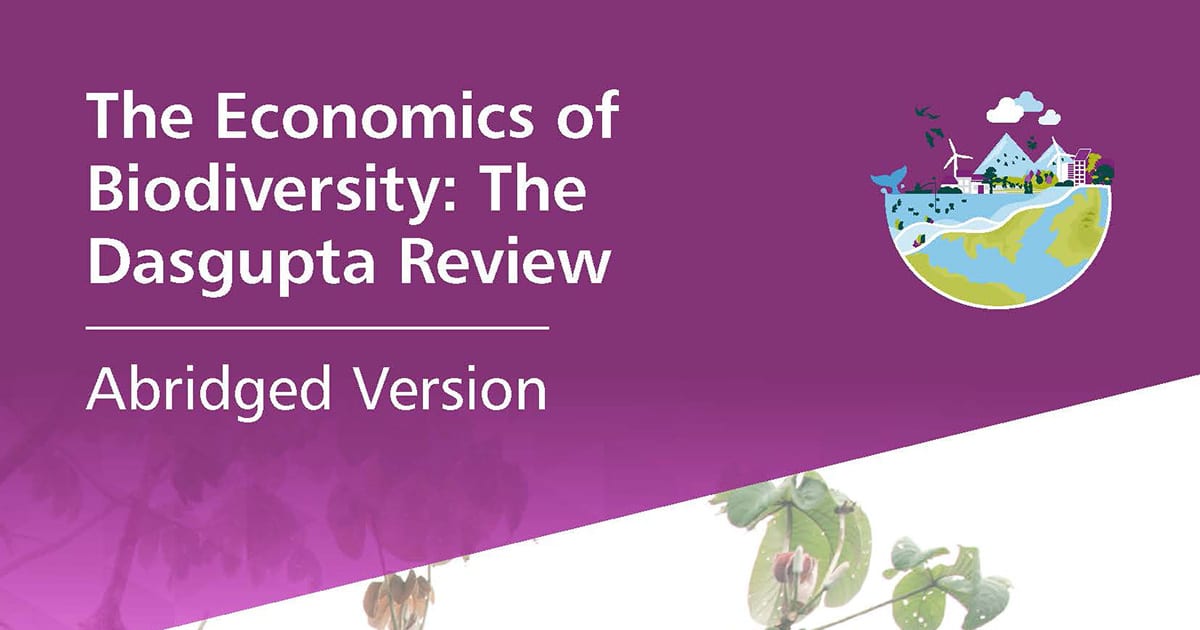
Oct 04, 2021 Dasgupta Review Revisited
In May, WellBeing News published an article alerting readers to the Dasgupta Review (Review) publication addressing the economics of biodiversity. We suggested that the Review could become a classic along with Rachel Carson’s Silent Spring but have just come across a significant critique of the Review by authors Spash and Hache (2021) in the journal Globalizations. The article is open access, so it is available for anyone to read. We would recommend it to anybody interested in ecological economics and the challenges of valuing Nature. The lead author (Clive Spash) is an ecological economist currently at the Vienna University of Economics and Business. He was one of the European Society for Ecological Economics founders in the 1990s and served six years (2000-2006) as president.
In the May issue of WellBeing News, it was noted that the Review frames the economics of biodiversity in terms of an investment portfolio. In this model, the concerned citizen would switch from using GDP (an income measure that reports the flow of dollar outputs in a year) as a measure of economic resources and instead develop a valuation of the wealth of a country, including not just produced and human capital, but also natural capital. The Review acknowledges that valuing natural capital can be very challenging but argues that “it is far better to work with rough and ready figures than to ignore whole swathes of capital goods by pretending they do not exist.” The Review complimented the United Nations on establishing the Sustainable Development Goals (SDG) program. The Review states that “International agreement on the SDGs was a remarkable, even noble, achievement, for the Goals unpick [identify] features of lives that would enable us to live well.” However, the Review then draws attention to a significant problem that “the Goals are not accompanied by an examination of whether, assuming they are achieved, they are sustainable.”
Spash and Hache take major issue with Review, arguing that it fails to achieve its aims (and those of the UK Government who sponsored the Review) on a wide variety of topics. In particular, they criticize the Review for focusing almost entirely on human utility with only a few discussions on the values of Nature that do not advance human interests. By doing so, the Review mostly ignores deontological ethical theories (usually couched in terms of rights). The proposed rights (values) of Nature should not be overridden simply by claims that overriding such rights would lead to a greater utility for humans.
WellBeing International welcomed the publication of the Review because it appeared to represent important establishment support for a significant re-evaluation of Nature and the current global challenges driven in considerable part by human population growth and measures (e.g., GDP) that emphasize and encourage growth in consumption. Having read the Spash and Hache (2021) critique, we are more realistic about the challenges in valuing Nature and limits to our current economic models. For example, Spash and Hache critique the Review for not adequately addressing population issues. Because human capital would be included as an asset in national wealth, an increase in the human population, especially young people, will logically lead to greater wealth. But human population increases have other impacts that would reduce national wealth. While the Review acknowledges limits to economic growth, Spash and Hache also note that it only mentions the Club of Rome’s important 1972 publication (and later adjustments), Limits to Growth, in a footnote.
We believe that the Review is an important publication because it raises the debate on recognizing the value of national resources. However, we would encourage readers to spend time with the Spash and Hache critique as well. Together, the two documents provide considerable food for thought and impetus for economists and others to evaluate models that value and, if needed, recreate those models that value Nature.


